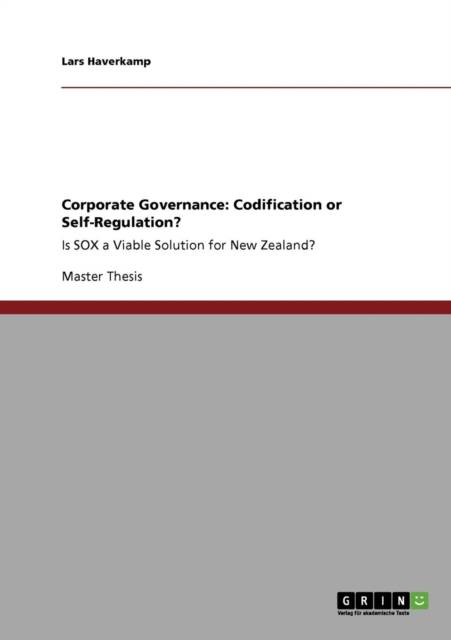
- Afhalen na 1 uur in een winkel met voorraad
- Gratis thuislevering in België vanaf € 30
- Ruim aanbod met 7 miljoen producten
- Afhalen na 1 uur in een winkel met voorraad
- Gratis thuislevering in België vanaf € 30
- Ruim aanbod met 7 miljoen producten
Zoeken
Corporate Governance
Codification or Self-Regulation?: Is SOX a Viable Solution for New Zealand?
Lars Haverkamp
Paperback | Engels
€ 42,95
+ 85 punten
Omschrijving
Master's Thesis from the year 2006 in the subject Law - Comparative Legal Systems, Comparative Law, grade: B+, University of Canterbury (Law School), language: English, abstract: The stock market has gained extraordinary significance over recent years. Large proportions of society invest in equity markets in order to save for their retirement. Various bodies exist to fight abuses by executives of publicly owned companies. Parliament has created the New Zealand Securities Commission (SEC), an independent Crown entity in terms of the Crown Entities Act 2004, to fight 'white collar fraud' and the abuse of business ethics and the law. Numerous scandals worldwide but especially the Enron case in the United States of America (USA) at the beginning of this decade shocked investors and led to a decrease in shareholder confidence. Investors lost their trust in corporate governance techniques and the credibility of managements. In the 1930s, in the aftermath of the 1929 stock exchange crash in the USA, Berle and Means ascertained the underlying problem of corporate governance as the separation of ownership and power. In accordance with Adam Smith, they explained that, as a basic human trait, executives never apply the same diligence when running a company as the owner of the same company might apply. This fundamental understanding is the reason for the necessity of corporate governance rules. As a pro-tection of shareholder interests, the interests of the owners of the company, the regulator tries to set standards which create investor confidence and security. By now the large majority of nations have implemented some form of corporate gov-ernance regime. The US government has tried to counter fraud and investor scepticism by adopting a statutory corporate governance code called the Sarbanes-Oxley Act 2002 (SOX). New Zealand, on the other hand, opted for a more voluntary ap-proach to governance regulation based on principles rather than legal norms, which impose no leg
Specificaties
Betrokkenen
- Auteur(s):
- Uitgeverij:
Inhoud
- Aantal bladzijden:
- 80
- Taal:
- Engels
Eigenschappen
- Productcode (EAN):
- 9783640462698
- Verschijningsdatum:
- 9/11/2009
- Uitvoering:
- Paperback
- Formaat:
- Trade paperback (VS)
- Afmetingen:
- 148 mm x 210 mm
- Gewicht:
- 113 g

Alleen bij Standaard Boekhandel
+ 85 punten op je klantenkaart van Standaard Boekhandel
Beoordelingen
We publiceren alleen reviews die voldoen aan de voorwaarden voor reviews. Bekijk onze voorwaarden voor reviews.








